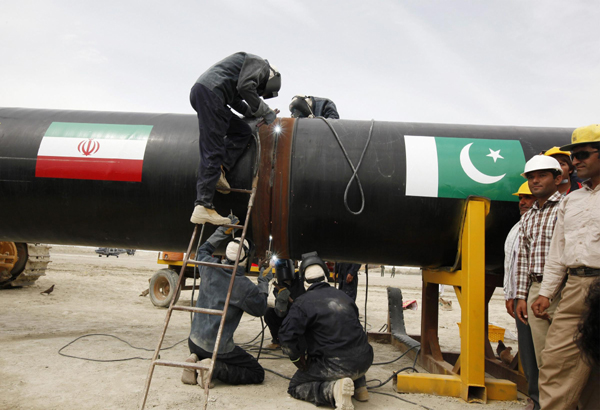US threatens sanctions on Pakistan over Iran pipeline
Updated: 2013-03-12 11:02
(Xinhua)
|
||||||||
 |
|
Iranians work on a section of a pipeline aft er the project was launched during a ceremony with presidents of Iran and Pakistan on Monday in the Iranian border city of Chah Bahar. The two leaders jointly unveiled a plaque for the successful conclusion of the project, which involves the laying of a 780 kilometer section of the pipeline on the Pakistani side, expected to cost some $1.5 billion. [Photo/Agencies] |
WASHINGTON - The United States on Monday threatened sanctions against Pakistan as the South Asian nation pressed ahead with a gas pipeline project with Iran.
"As I said, if this project actually goes forward, we have serious concerns that sanctions will be triggered," State Department spokeswoman Victoria Nuland told reporters at a regular news briefing.
"We've been straight up with the Pakistanis about these concerns," she said.
Despite Washington's strong opposition, Iran's President Mahmoud Ahmadinejad and his Pakistani counterpart Asif Ali Zardari inaugurated on Monday the $7.5 billion project in Iran's southeastern city of Chabahar, as Ahmadinejad said the West "has no right to obstruct" the project which will link Iran's gas pipeline to that of Pakistan.
Washington and its allies expanded their sanctions last year to target Iran's oil exports in their efforts to force the Islamic republic to stop its uranium enrichment activities, which are suspected of being used to make nuclear weapons.
"As we've talked about here before, what the legislation calls for is for our partner countries to be making a concerted effort to reduce their dependence on Iranian oil over time so we are able to waive sanctions as we see reductions being made," Nuland said.
She said Washington is supporting "large scale" energy projects in Pakistan that will add some 900 megawatts to the power grid by the end of 2013, fueling an additional 2 million households.

 Li Na on Time cover, makes influential 100 list
Li Na on Time cover, makes influential 100 list
 FBI releases photos of 2 Boston bombings suspects
FBI releases photos of 2 Boston bombings suspects
 World's wackiest hairstyles
World's wackiest hairstyles
 Sandstorms strike Northwest China
Sandstorms strike Northwest China
 Never-seen photos of Madonna on display
Never-seen photos of Madonna on display
 H7N9 outbreak linked to waterfowl migration
H7N9 outbreak linked to waterfowl migration
 Dozens feared dead in Texas plant blast
Dozens feared dead in Texas plant blast
 Venezuelan court rules out manual votes counting
Venezuelan court rules out manual votes counting
Most Viewed
Editor's Picks

|

|

|

|

|

|
Today's Top News
Live report: 7.0-magnitude quake hits Sichuan, heavy casualties feared
Boston suspect cornered on boat
Cross-talk artist helps to spread the word
'Green' awareness levels drop in Beijing
Palace Museum spruces up
First couple on Time's list of most influential
H7N9 flu transmission studied
Trading channels 'need to broaden'
US Weekly

|

|







